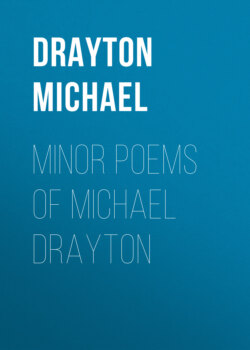Читать книгу Minor Poems of Michael Drayton - Drayton Michael - Страница 6
На сайте Литреса книга снята с продажи.
FOOTNOTES:
Оглавление[1] Cf. Elegy viij, To Henery Reynolds, Esquire, p. 108.
[2] Sir Aston Cokayne, in 1658, says that he went to Oxford, while Fleay asserts, without authority, that his university was probably Cambridge.
[3] Cf. the motto of Ideas Mirrour, the allusions to Ariosto in the Nymphidia, p. 129; and above all, the Heroical Epistles; Dedic. of Ep. of D. of Suffolk to Q. Margaret: 'Sweet is the French Tongue, more sweet the Italian, but most sweet are they both, if spoken by your admired self.' Cf. Surrey to Geraldine, ll. 5 sqq., with Drayton's note.
[4] Cf. Sonnet xij (ed. 1602), p. 42, ''Tis nine years now since first I lost my wit.' (This sonnet may, of course, occur in the supposed 1600 ed., which would fix an earlier date for Drayton's beginning of love.)
[5] Elegy ix, p. 113.
[6] Cf. Morley's ed. of Barons' Wars, &c. (1887), p. 6.
[7] Cf. E.H. Ep. 'Mat. to K.J.,' 100 sqq., &c.
[8] Professor Courthope and others. There was some excuse for blunders before the publication of Professor Elton's book; and they have been made easier by an unfortunate misprint. Professor Courthope twice misprints the first line of the Love-Parting Sonnet, as 'Since there's no help, come let us rise and part', and, so printed, the line supports better the theory that the poem refers to a patroness and not to a mistress. Cf. Courthope, Hist. Eng. Poetry, iii. pp. 40 and 43.
[9] Cf. E. and Phoebe, sub fin.; Shep. Sir. 145–8; Ep. Hy. Reyn. 79 sqq.
[10] Those reprints which were really new editions are in italics.
[11] 1594 ed., Pref. Son. and nos. 12, 18, 28; 1599 ed., nos. 3, 31, 46; 1602 ed., 12, 27, 31; and 1603 ed., 47.
[12] Meres thought otherwise. Cf. Palladis Tamia (1598), 'As Accius, M. Atilius, and Milithus were called Tragediographi, because they writ tragedies: so may wee truly terme Michael Drayton Tragaediographus for his passionate penning the downfals of valiant Robert of Normandy, chast Matilda, and great Gaueston.' Cf. Barnefield, Poems: in diuers humors (ed. Arber, p. 119), 'And Drayton, whose wel-written Tragedies, | And Sweete Epistles, soare thy fame to skies. | Thy learned name is equall with the rest; | Whose stately Numbers are so well addrest.'
[13] Cf. Meres, Palladis Tamia (1598), 'Michael Drayton doth imitate Ouid in his England's Heroical Epistles.'
[14] Cf. id., ibid., 'As Lucan hath mournefully depainted the ciuil wars of Pompey and Cæsar: so hath Daniel the ciuill wars of Yorke and Lancaster, and Drayton the civill wars of Edward the second and the Barons.'
[15] Cf. Elegy viij. 126–8.
[16] Cf. Morley's ed., Barons' Wars, &c., 1887, pp. 6–7.
[17] Cf. Elron, pp. 83–93, and Whitaker, M. Drayton as a Dramatist (Public. Mod. Lang. Assoc. of America, vol. xviij. 3).
[18] Cf. Nl. ij. 127 sqq., p. 172.
[19] Cf. Elegy ij. 20.
[20] Cf. Palladis Tamia: 'Michael Drayton is now in penning, in English verse, a Poem called Poly-olbion, Geographicall & Hydrographicall of all the forests, woods, mountaines, fountaines, riuers, lakes, flouds, bathes, & springs that be in England.'
[21] Cf. Amours (1594), xx and xxiv.
[22] Cf. Sonnet vj (1619 edition); which is a dignified summary of much that he says more coarsely in the Moone-Calfe.
[23] Cf. Morley's ed. Barons' Wars, &c., p. 8.
[24] Charles FitzGeoffrey, Drake (1596), 'golden-mouthed Drayton musical.' Guilpin, Skialetheia (1598), 'Drayton's condemned of some for imitation, But others say, 'tis the best poet's fashion … Drayton's justly surnam'd golden-mouth'd.' Meres, Palladis Tamia (1598),' In Charles Fitz-Jefferies Drake Drayton is termed "golden-mouth'd" for the purity and pretiousnesse of his stile and phrase.'
[25] Cf. E. H. E., pp. 90, 99 (ed. 1737); Elegy i; and Ode written in the Peak.
[26] Elegy viij, ad init.
[27] Palladis Tamia (1598).
[28] Cf. Returne from Parnassus, i. 2 (1600) ed. Arb. p. 11.
[29] Michael Drayton. A Critical Study. Oliver Elton, M.A. London: A. Constable & Co., 1905.
